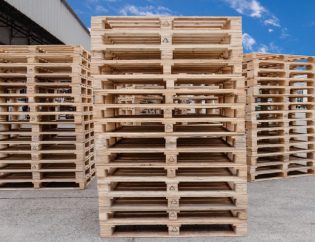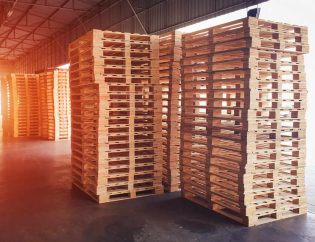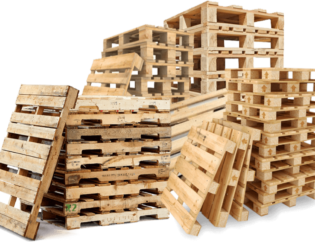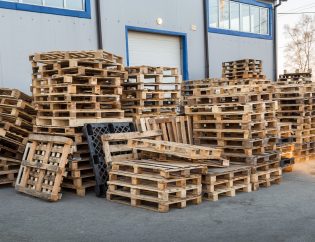
The shipping and transportation industry relies heavily on pallets to transport goods. Theplastic vs. wooden pallets debate has gained increasing importance over the years among businesses that need to strike a balance among cost, sustainability, and durability. While others are drawn to the long-lasting and hygienic nature of plastic pallets, some companies are drawn to the traditional nature and the lower initial cost of wood pallets.
Each of them has its advantages and disadvantages, and the nature of your operations, storage conditions, and long-term plans may influence the decision. For instance, the food and pharmaceutical industries might prefer plastic due to sanitation concerns. Still, warehouses with bulk materials may prefer to purchase wooden pallets, as they are inexpensive and easy to repair.
We have witnessed so many businesses at City Pallets getting confused while making this decision. Whether you’re looking to buy wooden pallets, customized wooden pallets, or plastic pallets, understanding the differences will help you make an informed decision.
Plastic Pallets vs Wooden Pallets: Key Differences
Cost and Affordability
Cost is one of the most immediate factors that businesses consider when making decisions. Wood palletsare typically less expensive initially and are the most preferred by companies that operate large shipping operations and have limited budgets. For businesses that frequently transport large quantities of products, partnering with a reputable wooden pallet manufacturing company such as City Pallets can result in even greater cost savings.
However, plastic pallets are more expensive to invest in. Nevertheless, to most small and mid-sized businesses, the fact that wood can be reused several times by selling wooden pallets makes it a more viable option.
Durability and Life Span
The other major distinction in the debate over plastic vs wooden pallets is durability. Plastic pallets are moisture-, chemical-, and pest-resistant, making them an excellent choice for industries with long-term use. They do not deteriorate structurally as fast as wood, particularly in severe conditions.
But wooden pallet crates also possess their advantages. They can support large weights without much bending or cracking. Additionally, they are inexpensive and easy to repair in case of breakage, compared to plastic substitutes.
Load Capacity and Weight
Plastic pallets tend to be lighter than most other types, and in certain situations, this can result in cost savings on shipping. They are designed to be lighter, making them easier to handle manually or by machines. Their strength, however, may be lower than that of custom wooden pallets, which can be constructed to support particular weight loads.
Conversely, wood pallets are heavier and have greater stability, making them more suitable for transporting heavy or bulky goods or materials that require additional stability. Most pallet suppliers recommend using wood in heavy-duty industries, such as construction or manufacturing, due to its dependable strength.
Hygiene and Cleaning Requirements
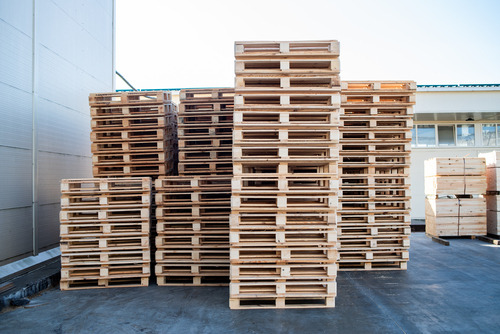
The plastic pallets are known to be more hygienic, as they can be easily washed and sanitized. This renders them the most appropriate option for industries such as pharmaceuticals or food and beverage, where contamination is a high possibility. They do not absorb liquids and do not harbour bacteria, which is a great plus in sensitive supply chains.
Conversely, wood pallets are porous and can absorb moisture, which can cause problems if used in areas where cleanliness is paramount. With that said, companies can always figure out a way to make them last longer by collaborating with a wooden pallet manufacturer to treat them so that they last longer and resist contamination.
The Environmental Impact and Recycling of Wooden Pallets
Regarding sustainability, wooden pallets are likely to have an advantage since they are made from renewable materials. They can also be easily recycled and reused. Most companies are seeking ways to recycle wooden pallets and reuse them to reduce waste. “Study Shows 95% of Wooden Pallets are Recycled” (National Wooden Pallet and Container Association).
Plastic pallets cannot be biodegraded, but they can be recycled to form other pallets or other products. The recycling process, however, is usually more complex than that of wood. Businesses that want to reduce their carbon footprint tend to purchase wooden pallets because they realize that when they reach the end of their life cycle, they can be used to make other products, such as mulch or wood chips.
Customization and Availability Options
The availability and flexibility of wood palletsare another great benefit. Wooden pallets are readily available for purchase from local suppliers and come in various standard sizes. You can search on Google for ‘who sells wooden pallets near me’ and easily find a supplier in your area or someone who can ship to your doorstep.
Also, when you deal with a wooden pallet manufacturer, you are free to order wooden pallets that are customized to meet certain load or storage conditions.
On the contrary, plastic pallets are typically offered in fixed designs. They are of uniform size and weight, but customization may be costly. Wooden pallet crates are a more viable option for industries that require special pallet sizes. Even companies that utilize rental schemes find it easier to trade or alter them compared to plastic ones.
Repair and Maintenance
Another aspect that distinguishes plastic and wooden pallets is their maintenance requirements. The breakage of a plastic pallet can be hard or even impossible to repair, and the entire pallet must be replaced. This may contribute to the long-term cost if your operations are particularly demanding on materials.
Conversely, wood palletsare quite easy to fix. A broken board can be replaced quickly, which extends the life of the pallet at a minimal cost. This feature can be particularly useful for businesses that purchase wooden pallets in large quantities, as it minimizes waste and reduces the cost of maintenance. Most pallet suppliers will even repair or trade in older stock, making it more cost-effective to maintain a wooden inventory.
How to Reuse Wooden Pallets and Extend Their Life
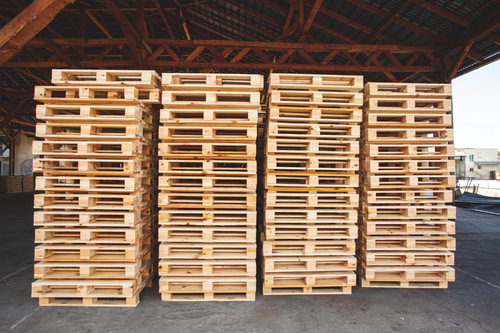
The ease of reusing wood pallets is one of the greatest benefits of wood pallets. Businesses can get innovative and practical about how to prolong the life of their products after a couple of shipments instead of disposing of them. A damaged pallet can be easily repaired, making it usable again and saving on costs while minimizing waste. There are companies that collect old pallets and refurbish them for sale.
For companies wishing to implement sustainability, knowledge of how to reuse wooden pallets can go a long way. Repaired pallets can be sent back to the supply chain, and the others will be used to make wooden pallet crates for storage. Or you can use them as shelving, or even as warehouses and office lightweight furniture.
When one pallet has really lived a shipping life, knowing how to recycle wooden pallets will ensure that they do not end up in a landfill. Most recycling facilities recycle unusable pallets into mulch or wood chips, retaining the materials within circulation. Firms such as City Pallets usually assist companies in establishing pallet recycling schemes where maximum value is retrieved from used inventory.
Not only is it environmentally friendly to extend the life of your pallets, but it is also cost-effective. Whether you reuse, repair, or recycle them, wooden pallets are a versatile and sustainable solution that can adapt to the evolving demands of your logistics.
Choosing the Right Pallet Supplier

The choice of the supplier is equally crucial as the choice of plastic or wood. A reliable supplier will help you balance cost, quality, and sustainability. Whether you want to purchase wooden pallets in large quantities, need wooden pallet crates to meet special shipping requirements, or even sell wooden pallets in your area, a partner with experience will always provide the right solution for your logistics.
City Pallets has established a good reputation in assisting businesses to select the right pallets in their respective industries. The right supplier does not just deliver products but also expertise, which is why it is important to find a supplier who can provide customized wooden pallets and advice on how to reuse wooden pallets.
The supplier that you select must be able to understand your business requirements, provide the same quality and possess a stable supply chain to fulfill your demand in time. Having a wooden pallet manufacturer that is able to provide repair or recycling services is a complete solution without the burden of having to coordinate with different vendors.
Conclusion
There is no universal answer that suits every business. Plastic pallets are hygienic, consistent, and durable in the long run, making them suitable for use in controlled environments and closed-loop systems. Nonetheless, their initial price and the fact that they can be repaired in a limited number of ways might not suit every operation.
Conversely, wood pallets are the most common solution worldwide due to their low cost, durability, and flexibility. Wooden pallets are a great choice when you want to purchase pallets for shipping. Wood remains a stable and environmentally friendly choice.
The correct choice will always depend on your industry, the volume of shipping, and your long-term objectives. If you are concerned about sustainability, you can learn how to recycle wooden pallets and collaborate with a supplier that offers repair and reuse services, making a significant impact on your environmental footprint.
With the help of reliable pallet suppliers, you can maintain effective, cost-efficient, and environmentally friendly shipping activities. Contact us today to get your custom wood pallet or learn about our recycling solutions.


